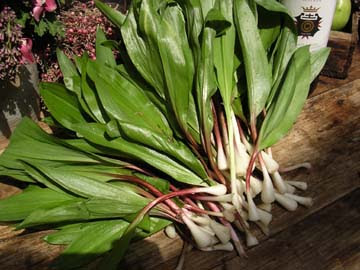
Ramps are a rite of Spring in the Southern Appalachians and there are numerous celebrations to commemorate their arrival. Places like Elkins, WV, Flag Pond, TN, Whitetop, VA, and Haywood County, NC all host events highlighting the ramp. Bradford, PA holds an annual "Stinkfest" on the first Saturday in May each year in honor of the pungent plant. Another annual event is held in Richwood, WV called "The Feast of the Ramson." The Chamber of Commerce there even publishes this explanation:
The first sign of the Zodiac calendar is Aries, which ushers in the spring during March and April. Aries is the Arabic word for Ram, the male of the sheep family, stout, rambunctious, and a bit odoriferous! The plant we call the 'Rams' Son' is the first green shoot to show itself in the deep Appalachian woodlands.
The ramp's smooth leaves are sharply defined and deep green crowning a slender crimson-burgundy stalk emanating from a pristine white bulb. But the most apparent characteristic is the unmistakable pungent aroma. The smell is intense, providing an aromatic punch, far more pronounced than its refined relative the leek. In ramp country it is munched raw. But for those less bold it can be cooked which transforms the vegetable into a sweet and mild side dish. For generations the fresh, sharp garlicky-onion ramp has been consumed as folk remedy, a tonic to ward off the many ailments of Winter. And scientific studies have shown that the vitamin and mineral content contained in the ramp is indeed very healthy, especially after a long winter without fresh green vegetables.
No comments:
Post a Comment